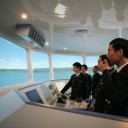If the war drags on, China's foreign trade with Iraq's six neighbouring nations - Iran, Turkey, Syria, Jordan, Kuwait and Saudi Arabia - would be adversely affected. Last year, the mainland's trade with the six countries amounted to US$11.683 billion, including exports of US$5.082 billion and imports of US$6.601 billion. Basically, it is domestic consumption that will serve as the main engine to power China's future economic growth as well as its industrial upgrade in the coming 20 years. Stephen Roach, chief economist of Morgan Stanley, went further to warn that China's economic development will unavoidably be affected due to its excessive dependence on exports, given a looming global economic recession to be triggered by the US-led war in Iraq. The conflict has already hit exporters - overseas orders have fallen; and transport and insurance costs have increased.
In the first two months of this year, Shanghai's exports to Iraq were nil compared with US$2.08 million for the corresponding period last year, according to statistics from the local customs administration. Fujian Province experienced a year-on-year fall of 32.7 per cent to US$109 million in exports to the Middle East in the first two months of this year. Manufacturers of glass, footwear and apparel in eastern Zhejiang Province have suspended their production lines. Zhao Ying, a researcher with the Institute of Industrial Economy under the Chinese Academy of Social Sciences, warned that China may not have an opportunity to secure contracts related to post-war reconstruction activity in Iraq.
"If a pro-US administration is set up in post-war Iraq, Chinese firms do not face favourable conditions and will most likely be excluded from most of the reconstruction contracts," Zhao said. Even if the United Nations were to play a role in Iraq's reconstruction, it would take concerted efforts by Chinese companies to win some contracts. A decrease of 1 per cent of US GDP would result in a 4.6 per cent reduction of China's gross exports. To offset this, China should adhere to the policy of expanding domestic demand. China's economic growth mainly depends on domestic demand at present. China is therefore more capable of warding off external shocks than some medium and small-sized countries and those whose oil is largely dependent on imports. China needs to accelerate the adjustment of its oil strategy and to promote plural import sources to ensure a stable oil supply. China should enlarge its strategic oil investment in overseas markets to cultivate new energy supply bases. China also needs to speed up the establishment of a nationwide oil reserve system and promote its energy-saving policy. The economic recession in the world's major trade powers and industrialized countries will hinder the economic growth of export-driven economies including China. Last year, the growth of China's exports contributed about 74 per cent of its gross domestic product growth. Roach said Morgan Stanley has lowered China's forecast economic growth rate for this year because of risks from its over-dependence on exports. Foreign trade experts have estimated that China's potential export losses in its foreign trade with the Middle East alone may amount to US$12 billion.
What's worse, they added, foreign trade could be severely affected if the United States, as China's biggest export market, was pulled further into the economic doldrums by the war. As an earlier ominous sign, China recorded a US$570 million trade deficit in the first two months of this year, the first time in more than a dozen years. Considering China's long-term trade surplus since the 1990s, the trade deficit at the start of this year should be taken as an early warning. The poor export performance apparently suggested a tough task ahead for China to sustain a robust export growth this year. Despite last year's outstanding performance, China's fast-growing foreign trade was expected to slow down this year because of a host of uncertain factors, officials and economic researchers have warned. Former foreign trade minister Shi Guangsheng once said that the country is targeting a 7 per cent growth in its foreign trade for 2003. The modest goal is in stark contrast with an increase of 21.8 per cent in China's exports and imports last year. Amid a global economic recession, China's foreign trade hit a record high of US$620.79 billion last year, with exports jumping by 22.3 per cent to reach US$325.57 billion. Although there is little possibility for China to reap a trade deficit for the whole year, one thing for sure is that the total contribution from foreign trade to the economic growth will fall.
The proactive fiscal policy, characterized by increasing government expenditure to spur domestic consumption demand, is expected to play a bigger role in expanding internal demand to stimulate economic development. Chinese consumers are optimistic about the country's economic development in the coming 12 months, the National Bureau of Statistics said recently. Encouraged by the strong economic performance recorded in 2002, the confidence index reflecting consumers' evaluation of the current economy and expectations for future economic development reached 97.7 points in January, the bureau said in a statement. The confidence index rose further to 98.8 points in February - the highest since the beginning of 2002 - buoyed by Spring Festival spending and high expectations for the 10th National People's Congress and the 10th National Committee of the Chinese People's Political Consultative Conference.
But the confidence index dropped slightly to 97.6 points in March, weighed down by growing anxiety over the US-led war on Iraq, the bureau said. About 78 per cent of the consumers surveyed believed the external environment for China's economic development was unstable. However, about 62 per cent of the consumers expressed "satisfaction" on China's economic performance and more than 50 per cent of those surveyed expressed confidence in the country's future economic development, the bureau said. Reconstruction work in Iraq is estimated to cost up to US$100 billion.
In the first two months of this year, Shanghai's exports to Iraq were nil compared with US$2.08 million for the corresponding period last year, according to statistics from the local customs administration. Fujian Province experienced a year-on-year fall of 32.7 per cent to US$109 million in exports to the Middle East in the first two months of this year. Manufacturers of glass, footwear and apparel in eastern Zhejiang Province have suspended their production lines. Zhao Ying, a researcher with the Institute of Industrial Economy under the Chinese Academy of Social Sciences, warned that China may not have an opportunity to secure contracts related to post-war reconstruction activity in Iraq.
"If a pro-US administration is set up in post-war Iraq, Chinese firms do not face favourable conditions and will most likely be excluded from most of the reconstruction contracts," Zhao said. Even if the United Nations were to play a role in Iraq's reconstruction, it would take concerted efforts by Chinese companies to win some contracts. A decrease of 1 per cent of US GDP would result in a 4.6 per cent reduction of China's gross exports. To offset this, China should adhere to the policy of expanding domestic demand. China's economic growth mainly depends on domestic demand at present. China is therefore more capable of warding off external shocks than some medium and small-sized countries and those whose oil is largely dependent on imports. China needs to accelerate the adjustment of its oil strategy and to promote plural import sources to ensure a stable oil supply. China should enlarge its strategic oil investment in overseas markets to cultivate new energy supply bases. China also needs to speed up the establishment of a nationwide oil reserve system and promote its energy-saving policy. The economic recession in the world's major trade powers and industrialized countries will hinder the economic growth of export-driven economies including China. Last year, the growth of China's exports contributed about 74 per cent of its gross domestic product growth. Roach said Morgan Stanley has lowered China's forecast economic growth rate for this year because of risks from its over-dependence on exports. Foreign trade experts have estimated that China's potential export losses in its foreign trade with the Middle East alone may amount to US$12 billion.
What's worse, they added, foreign trade could be severely affected if the United States, as China's biggest export market, was pulled further into the economic doldrums by the war. As an earlier ominous sign, China recorded a US$570 million trade deficit in the first two months of this year, the first time in more than a dozen years. Considering China's long-term trade surplus since the 1990s, the trade deficit at the start of this year should be taken as an early warning. The poor export performance apparently suggested a tough task ahead for China to sustain a robust export growth this year. Despite last year's outstanding performance, China's fast-growing foreign trade was expected to slow down this year because of a host of uncertain factors, officials and economic researchers have warned. Former foreign trade minister Shi Guangsheng once said that the country is targeting a 7 per cent growth in its foreign trade for 2003. The modest goal is in stark contrast with an increase of 21.8 per cent in China's exports and imports last year. Amid a global economic recession, China's foreign trade hit a record high of US$620.79 billion last year, with exports jumping by 22.3 per cent to reach US$325.57 billion. Although there is little possibility for China to reap a trade deficit for the whole year, one thing for sure is that the total contribution from foreign trade to the economic growth will fall.
The proactive fiscal policy, characterized by increasing government expenditure to spur domestic consumption demand, is expected to play a bigger role in expanding internal demand to stimulate economic development. Chinese consumers are optimistic about the country's economic development in the coming 12 months, the National Bureau of Statistics said recently. Encouraged by the strong economic performance recorded in 2002, the confidence index reflecting consumers' evaluation of the current economy and expectations for future economic development reached 97.7 points in January, the bureau said in a statement. The confidence index rose further to 98.8 points in February - the highest since the beginning of 2002 - buoyed by Spring Festival spending and high expectations for the 10th National People's Congress and the 10th National Committee of the Chinese People's Political Consultative Conference.
But the confidence index dropped slightly to 97.6 points in March, weighed down by growing anxiety over the US-led war on Iraq, the bureau said. About 78 per cent of the consumers surveyed believed the external environment for China's economic development was unstable. However, about 62 per cent of the consumers expressed "satisfaction" on China's economic performance and more than 50 per cent of those surveyed expressed confidence in the country's future economic development, the bureau said. Reconstruction work in Iraq is estimated to cost up to US$100 billion.
请登录后发帖

 联系我们人工客服
联系我们人工客服



















 :1391995811
:1391995811

